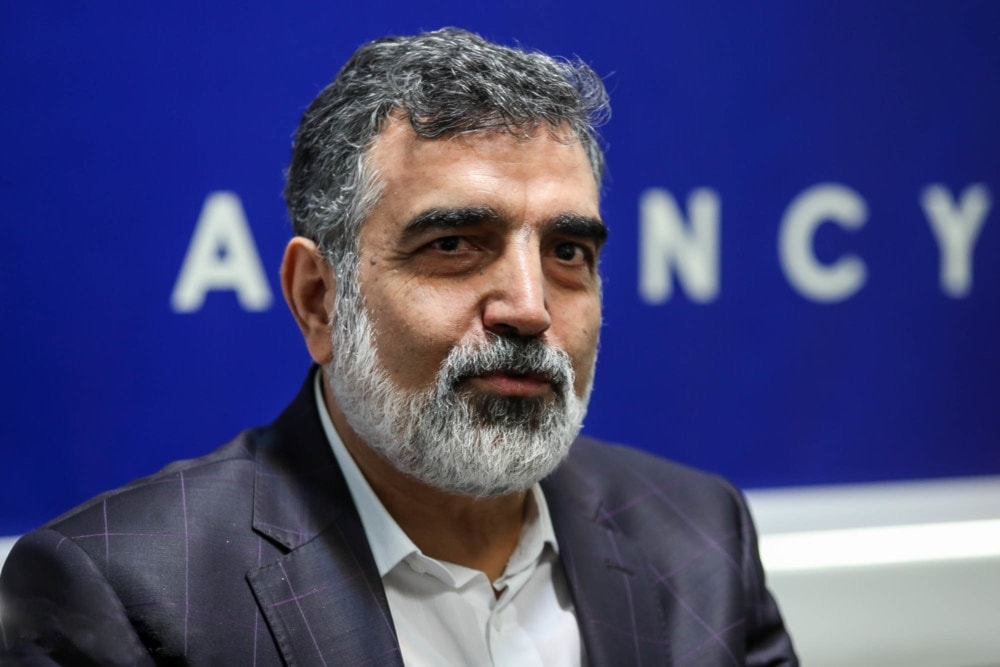Iran open to nuclear commitments if its rights are met: AEOI spokesman
The AEOI spokesperson's statements come amid intensified efforts by Trump to push Iran towards negotiating a nuclear deal, under the guise of preventing Tehran from building nuclear weapons.
-

Behrouz Kamalvandi, Spokesman for the Atomic Energy Organization of Iran (AEOI), on a visit to Mehr News Agency, Iran, 14 August 2018 (Mehr News Agency)
Iran could commit to its nuclear commitments again, on the condition that its rights are not ignored, stated the spokesperson for the Atomic Energy Organization of Iran Behrouz Kamalvandi.
In his statement, Kamalondi added that during the past year "International relations have been strengthened in various fields with other countries, including China and Russia, and relations with the International Atomic Energy Agency have been reinforced to prove the legitimacy of the Islamic Republic of Iran."
He added "Unfortunately, there is a great deal of distortion against Iran's nuclear industry at the international level, as we are accused of engaging in non-peaceful activities. However, Iran undergoes the highest number of inspections by the International Atomic Energy Agency, with no other country being monitored as extensively as we are."
Iran nuclear program being smeared
The AEOI spokesperson noted that despite the transparency of Iran's nuclear program, media outlets propagate claims Iran does not deserve. He emphasized the importance of combating "the enemy's" efforts to misrepresent the Nuclear Energy Industry in the Islamic Republic of Iran.
Kamalvandi highlighted that Iran "sought, through various legal methods, explanatory memorandums, meetings, and media efforts, to respond to the distortions carried out by the Israeli entity against Iran's nuclear program," emphasizing that "there is no doubt that the truth will ultimately prevail."
He clarified that the international community knows Iran's righteousness very well, emphasizing that immense pressure was put on Iran following the United States' withdrawal from the JCPOA.
He added that they have tried to portray the situation as if Iran was responsible for these circumstances, while everyone knows that if the Islamic Republic of Iran has suspended part of its commitments under Articles 26 and 36, it is due to the other party's failure to fulfill its obligations, leaving no other alternative.
Iran adhering to commitments
The spokesman continued to say that 15 successive reports by the agency indicated that Iran was adhering to its commitments, adding that Iran had waited a year after the US withdrawal from the nuclear deal, hoping for improved conditions and corrective measures.
He emphasized that the Islamic Republic remains steadfast in reclaiming its rights and hopes that Western countries, having repeatedly tested Iran, now understand that pressure is ineffective and may lead to counterproductive outcomes.
He concluded by stating that one cannot speak the language of force with a great nation like Iran, which has a history spanning thousands of years. He emphasized that Iran has endured immense pressure throughout history and remains capable of confronting such challenges.
The Atomic Energy Organization of Iran's statements closely follow intensified threats by Trump. calling Iran to negotiate a nuclear deal or face military action, which drew widespread condemnation from Iranian officials.
More of a 'threat than an offer'
On Thursday, Araghchi said that a recent letter from Trump, calling for renewed nuclear talks, was "actually more of a threat" than an offer, adding that Tehran would issue a response soon.
Speaking to Iranian state television, he noted that while the letter appeared to present opportunities, its tone was ultimately threatening, stating that Iran was carefully reviewing its contents and would respond "in the coming days."
Earlier this month, Trump told Fox News that he had sent a letter to Sayyed Ali Khamenei, urging Iran to begin nuclear deal talks or face military action. In parallel, the US imposed new sanctions on Iran as part of Trump's "maximum pressure" policy.
However, Iran has stated that it will not engage in talks with the US under pressure or threats, and is currently considering its response to Trump's letter, which was seen as both a threat and an offer of potential opportunities.
In the interview, the foreign minister explained that Iran's refusal to negotiate with the US stems from historical experience, not stubbornness. He emphasized that Iran had previously used diplomacy to its fullest to lift the sanctions imposed on the country.
Iran entered the negotiations for the 2015 nuclear deal, known as the Joint Comprehensive Plan of Action, with good faith. "After the agreement, we adhered to all our commitments in good faith. Who betrayed diplomacy here? It was the US that abandoned all this and went back to another path. This has created some distrust," he said.
Araghchi stated that the JCPOA, in its current form, cannot be revived due to Iran's advanced nuclear situation and the imposition of new sanctions on the country, adding, "Therefore, it is not realistic to revive the JCPOA, but it can still serve as a basis and a model for negotiations."
He explained that Iran is focused on two key objectives: neutralizing sanctions and holding negotiations to lift them, emphasizing that bypassing and making the sanctions ineffective takes priority over the negotiation process.

 5 Min Read
5 Min Read








